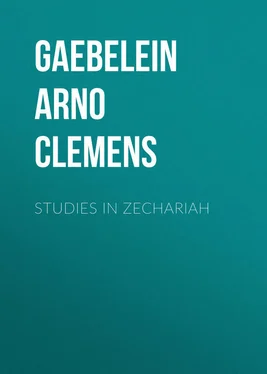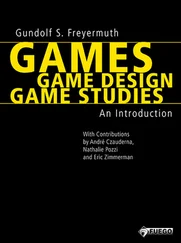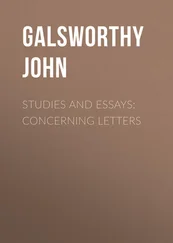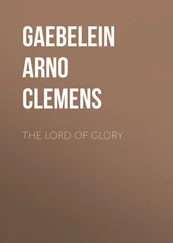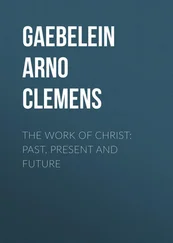Arno Gaebelein - Studies in Zechariah
Здесь есть возможность читать онлайн «Arno Gaebelein - Studies in Zechariah» — ознакомительный отрывок электронной книги совершенно бесплатно, а после прочтения отрывка купить полную версию. В некоторых случаях можно слушать аудио, скачать через торрент в формате fb2 и присутствует краткое содержание. Жанр: foreign_religion, foreign_antique, foreign_prose, на английском языке. Описание произведения, (предисловие) а так же отзывы посетителей доступны на портале библиотеки ЛибКат.
- Название:Studies in Zechariah
- Автор:
- Жанр:
- Год:неизвестен
- ISBN:нет данных
- Рейтинг книги:5 / 5. Голосов: 1
-
Избранное:Добавить в избранное
- Отзывы:
-
Ваша оценка:
- 100
- 1
- 2
- 3
- 4
- 5
Studies in Zechariah: краткое содержание, описание и аннотация
Предлагаем к чтению аннотацию, описание, краткое содержание или предисловие (зависит от того, что написал сам автор книги «Studies in Zechariah»). Если вы не нашли необходимую информацию о книге — напишите в комментариях, мы постараемся отыскать её.
Studies in Zechariah — читать онлайн ознакомительный отрывок
Ниже представлен текст книги, разбитый по страницам. Система сохранения места последней прочитанной страницы, позволяет с удобством читать онлайн бесплатно книгу «Studies in Zechariah», без необходимости каждый раз заново искать на чём Вы остановились. Поставьте закладку, и сможете в любой момент перейти на страницу, на которой закончили чтение.
Интервал:
Закладка:
The words which follow, and which are really the good and comfortable words, contain the divine programme of the restoration of His people Israel. What is mentioned here in a few sentences is given in detail in the fourth and fifth night vision as well as in the closing chapters of the prophet. I am returned to Jerusalem with mercies. This does not mean a spiritual return or a return of God’s mercies to Jerusalem only, but it means likewise His literal return when He appears the second time; and connected with this second appearing of the great Jehovah in Jesus Christ will be seen the Shekinah cloud as Israel had it in the wilderness and the first temple. This is seen in the second chapter. The Lord had withdrawn from His people. I will go away and return to my place. (Hosea v: 15.) For behold your house is left unto you desolate. For I say unto you, ye shall not see me henceforth till ye shall say, Blessed is he that cometh in the name of the Lord. (Matthew xxiii: 38, 39.) The Lord being absent in His person from His people, Israel is forsaken, the land desolate. There can be no true restoration of Israel till He has come whose right it is.
So many good people think that the present Zionistic movement of the Jews is that promised salvation for the scattered nation. This is not so. It is an attempted restoration. Here in the good and comfortable words Zechariah hears, the return of the Lord stands first. Then His house is to be built. While it meant in the prophet’s time the building of the second temple, it means in connection with the coming restoration the building of that great millennial temple which Ezekiel saw in visions and describes in detail – the temple which will be indeed a house of prayer to all nations, and the glory of this latter house shall be greater than the former. The rebuilding of the city of Jerusalem is next in order. A line is to be stretched forth upon Jerusalem. The city is enlarged, for from henceforth Jerusalem is to be the centre of the earth. (Ezekiel xxxviii: 12.) My cities in prosperity shall overflow. The blessing will not be confined to the Temple and to Jerusalem, but there will be an overflow, and all the cities in the land will flow over with prosperity. For the Lord shall comfort Zion; He will comfort all her waste places, and He will make her wilderness like Eden and her desert like the garden of the Lord. Joy and gladness shall be found therein, thanksgiving and the voice of melody. (Isaiah li: 3.)
Oh, happy time! when wilt thou come? Even so come, Lord Jesus, our Lord and Israel’s King! Other visions will show us that Jerusalem will then indeed be a praise in the earth, for many nations will then be joined to the Lord, and the streams of living waters will overflow and bring joy, salvation and healing to the nations around who join in the Hallelujah chorus of Jeshurun.
CHAPTER II
The second night vision. The four horns and the four smiths. The third vision. The man measuring Jerusalem. Restoration and glory of Jerusalem foretold.
The second night vision of Zechariah is closely connected with the first. In the first vision the time is given when the Lord will turn in mercy to Jerusalem – the time when the nations are at ease, and, having helped forward the affliction of His people, are ripe for judgment. The scenes have passed away, and now the prophet lifts his eyes again and he sees four horns . The question he asks of the angel is answered by him, that these are the horns which have scattered Judah, Israel and Jerusalem . Then four smiths appear, and the angel informs the prophet that these are come to fray them (the four horns), to cast down the horns of the nations which lifted up their horn against the land of Judah to scatter it (chapter i: 18-21.) The four horns are the powerful and proud enemies of the people of God. Why four horns? Some have said because the enemies of Israel have come against the land and Jerusalem from all four cardinal points of the compass, and have scattered the people east and west, north and south. Others mention different nations who were at Zechariah’s time in existence and instrumental in scattering Israel. The horn is a symbol of power and pride, and in prophecy stands for a kingdom and for political world power. The ten horns which Daniel saw on the terrible fourth beast rising from the sea denote ten kingdoms, and in Revelation xvii: 12 we read, “The ten horns that thou sawest are ten kings.” The four horns in this second vision must be therefore kingdoms – world powers. The number four, as it is well known to every student of the prophetic Word, is found twice in the book of Daniel. Nebuchadnezzar’s great image was divided into four parts, each standing for a world power, namely: the Babylonian, the Medo-Persian, the Graeco-Macedonian and the Roman power. The latter is still in existence and will be till the stone smites the image at its feet and pulverizes it. Daniel’s vision (chapter vii) brings before him four mighty beasts, the last having ten horns, just as the limbs of the image ended in feet with ten toes. With such a revelation in the book of Daniel it is very easy to understand that the four horns can mean nothing else than the same powers of Gentile rule and supremacy existing during the entire time when the kingdom has been taken from Israel. These four world powers are horns. They unite strength and pride, and are bent upon scattering Israel. They are the enemies of Israel, and therefore the enemies of God. And now the four smiths appear on the scene to fray them – to cast down the horns of the nations. Four horns are overcome and broken down completely by four smiths. It does not follow that the four smiths must be four other powers. The vision seems to teach two facts: first, the horns will be broken and cast down; and in the second place, God has for every hostile power which has sinned and sins against his people a corresponding greater power to overcome it, break it into pieces and cast it down. However, we believe the vision will have its fulfillment in the time of Jacob’s trouble. The elements of all the four world powers will then in some way be concerned in the onslaught on Jerusalem – a confederacy of nations; representatives of many nations will come up against Jerusalem, and it will be then that the four horns are broken by the four smiths and the casting down will be done.
The third night vision is one of the most interesting and instructive. As the third one, it forms the climax of the good and comfortable words which were spoken concerning Jerusalem. The number three stands in the Word of God for resurrection, life from the dead. Thus in Hosea, concerning Israel, “After two days Thou wilt revive us, and on the third day Thou wilt raise us up” (Hosea vi: 2). In this third vision Zechariah sees the glorious restoration of Israel, which has been the burden of so many prophecies, and the glory which is connected with that restoration. In this night vision Zechariah hears of a restoration and of a glory which has never yet been fulfilled in the history of God’s people. Those teachers of the Word who see in Zechariah’s night visions nothing but fulfilled prophecy, cannot answer certain questions satisfactorily, and their only refuge must be a spiritualizing of this restoration. Another thought before we take up this third vision. The vision of restoration comes after the enemies of Israel have been cast down. That prophecy might be fulfilled; prophecy about a believing, suffering Jewish remnant; prophecy concerning Jacob’s trouble, etc., a mock restoration, generally termed a restoration in unbelief, is to take place. There can be no doubt whatever that we are privileged to see the beginning of this restoration of part of the Jewish nation to the land of the fathers in unbelief: It is one of the signs of the nearness of that event for which the Church hopes, prays and waits – “our gathering together unto Him.” The world and the lukewarm Christian does not see it, but he who loves the Word and lives in the Word, has eyes to see and a hearing ear and knows what is soon coming. The true restoration, however, will only come as it is seen so clearly in these night visions after the enemies have been overcome, the horns cast down, the image smashed – in other words, after the Lord has come.
Читать дальшеИнтервал:
Закладка:
Похожие книги на «Studies in Zechariah»
Представляем Вашему вниманию похожие книги на «Studies in Zechariah» списком для выбора. Мы отобрали схожую по названию и смыслу литературу в надежде предоставить читателям больше вариантов отыскать новые, интересные, ещё непрочитанные произведения.
Обсуждение, отзывы о книге «Studies in Zechariah» и просто собственные мнения читателей. Оставьте ваши комментарии, напишите, что Вы думаете о произведении, его смысле или главных героях. Укажите что конкретно понравилось, а что нет, и почему Вы так считаете.
